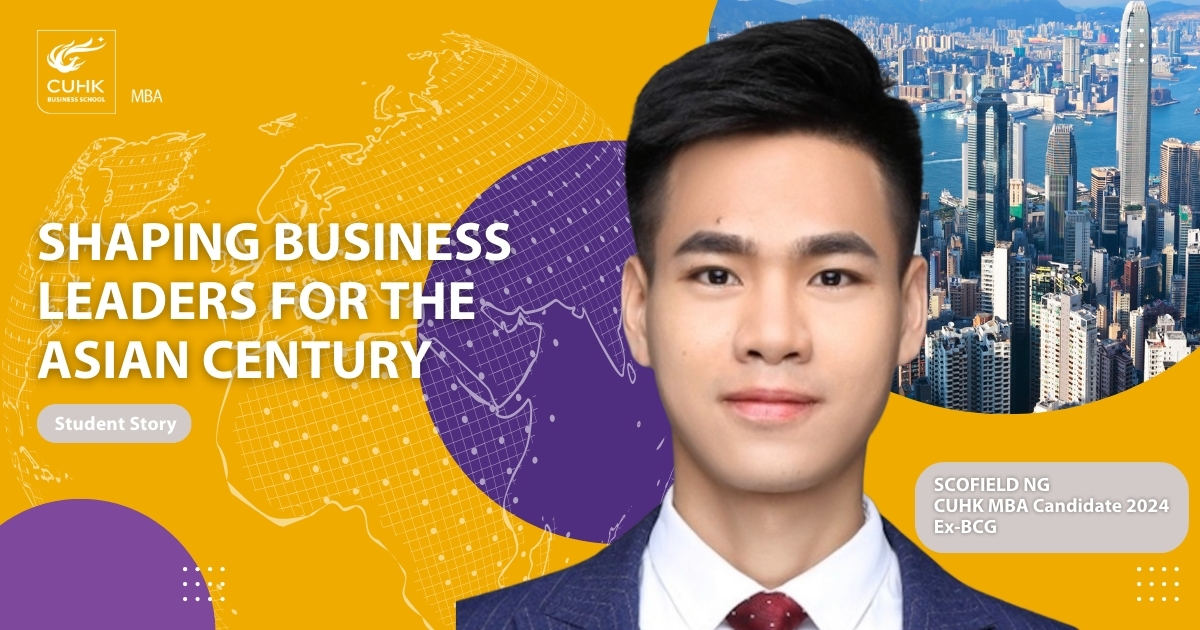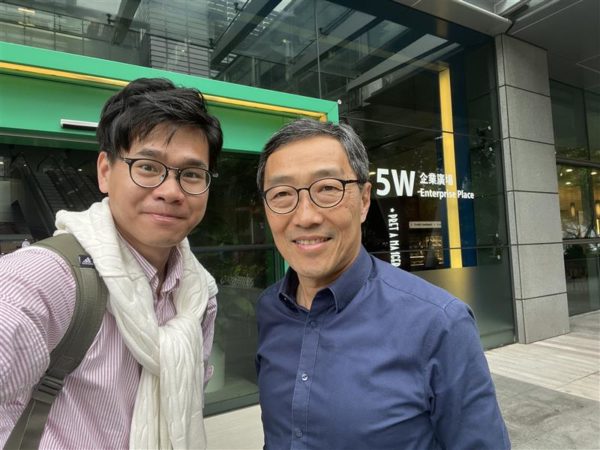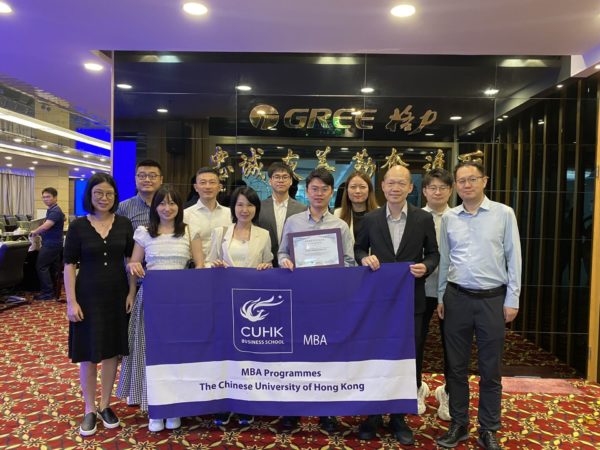Scofield Ng (MBA 2024): Shaping business leaders for the Asian Century


Scofield Ng (second from right) at a networking event under the CUHK MBA’s LEAP Adviser scheme.
When Scofield Ng left a plum role in 2022 to pursue his passion for business, he never expected to be mentored by a CEO as he made a medtech idea a reality.
Prior to this, the pharmacy graduate had spent eight years at Johnson & Johnson in China, doing product management, sales and marketing.
“The longer I stayed in a commercial role, the more I wanted to develop business knowledge, such as in financial accounting and macroeconomics,” he says. “I wanted to look at projects from the perspective of a CEO or general manager: how much money to put in, how to project a timeline for returns, calculate financial index, for example NPV or IRR – things like that.”
So he took a leap of faith. After reviewing numerous options globally, Ng chose the MBA programme at the Chinese University of Hong Kong (CUHK), known for its entrepreneurship focus and track record of producing Asian business leaders.
“Studying in Hong Kong was a priority, given its dynamic environment and the presence of both Western and Eastern cultures,” he says. “The biggest difference with CUHK is that it not only offers global exploration in an international environment, but also insights into the Chinese market.”
CEO as a mentor

The move quickly paid off. Within months of embarking on his MBA programme with a concentration in entrepreneurship, Ng had leveraged his corporate experience to conceive an idea for a business: 3D model reconstruction services to help doctors with complex surgeries.
Southeast Asia, with its booming middle class and economic development fuelling healthcare spend, is the primary target market. “A focus on the Asia market is a must nowadays,” he says.
To shape the business strategy, he leveraged the school’s LEAP@BEAM scheme, which taps its legacy alumni network and ecosystem of elite business and community leaders to enable emerging business leaders to build regional networks as the Asian Century unfolds.
Prominent alumni from CUHK – the first school in Asia to offer an MBA programme in 1966 – include Hong Kong Financial Secretary Paul Chan Mo-po and numerous city bank chiefs.
Under the LEAP scheme, Ng applied for mentorship and was selected as a mentee as CUHK MBA alumni Albert Wong. Wong is chief executive of the Hong Kong Science and Technology Parks Corporation, which houses the city’s largest innovation and technology ecosystem.
Ng believes his background in medical manufacturing and experience in startup pitching resonated with Wong, who spent 15 years at multinational conglomerate General Electric.
Wong not only advised Ng on his business, but also shared insights into the Science Park’s initiatives and around career development strategies.
“I get MBA ‘assignments’ – for example, how do I think the Science Park can leverage synergies between markets?” Ng says. “I give answers and we discuss. It’s fantastic. You get the chance to show your skills, attitudes and perspectives to a CEO who has abundant experience in the related area.”
Asian business leadership

The CUHK MBA aims to be an axis of technology and business in the region, by nurturing growing industries in the Asian Century. This includes industries such as manufacturing.
As such, Ng’s MBA programme includes regional ‘treks’, such as corporate visits to companies in China’s Greater Bay Area. At manufacturing giant Gree Electric Appliances in Zhuhai and Electric Vehicle maker BYD in Shenzhen, Ng and his peers chatted with a department manager about management strategy, the electronics titan’s competitive edge, and the role playing by the vehicle industry for the GDP growth.
“In class, it’s all about theory and framework, but these trips provide practical insights and deeper understanding on why a particular strategy was used,” he says.
Through the school’s ideation programme, he also pitched his business to a panel of university judges, securing HK$100,000 in seed funding.
Come January, he will embark on a semester’s exchange to Michigan University, where he hopes to research the US’s medtech services market, observe its latest technologies, attend medical congresses to network with manufacturers, and connect with CUHK alumni based in the West.
“CUHK is famous for its strong global connections,” Ng says. “I want to explore more cultures and perspectives, whether in Indonesia, the Philippines, Hong Kong or Japan.”
Network effect

Elected a student representative, Ng also sets up coffee chats with business leaders – including a senior manager at JP Morgan that he met at an alumni event – and helps facilitate the learning experience of his peers.
These opportunities to build personal relationships across the cohort gave rise to an unexpected benefit: two co-founders for his startup, after several peers expressed interest in becoming business partners.
The university’s medical school, which ranks among the top in Asia, was another drawcard. After introducing himself as an MBA student, Ng found its professors obliging when he reached out to conduct customer research.
“They gave their time to answer my questions as potential end users,” he says. “You need to be active to reach out to the different alumni and professors, to keep asking questions. When you keep doing this, you will learn a lot.”
In a similar vein, he’s optimistic that the CUHK MBA branding will open doors to regional medicine colleges as potential future customers, given the school’s reputation as a hub for thought leaders.
His only regret, he adds, is not applying for the MBA programme earlier. “There’s a Chinese saying that the best time to plant a tree was 10 years ago,” he says. “It took me several years to make a decision. So I think the best time to start your application is now.”
This article was originally published by efinancialcareers, a leading source of information for prospective master’s students.

